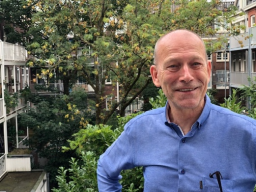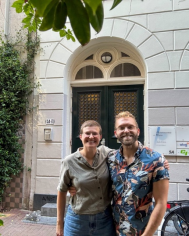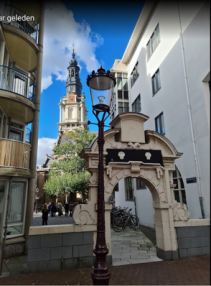All good things come to an end — and the time has now come for me. In May 2025 I turned 69, which feels like the right moment to retire. For some of you, this won’t come as a surprise, as I’ve already mentioned it to those who asked during consultations. For long it has been my quiet wish to stop working as a GP before my 70th birthday. It took some time, but I’m happy to say I’ve found good successors. Still, handing over the baton comes with a sense of melancholy and heartache. With a select group of patients, I’ve grown older together over the years, and we’ve come to know each other well. Saying goodbye and letting go is a part of life, but it always comes with both a smile and a tear. On the one hand, there are the good memories; on the other, the difficult phases we’ve shared — in the privacy of the consultation room, during home visits, or at the bedside of a terminally ill patient. These moments have been deeply enriching. I’m still amazed by the intimacy people dared to share, and that I was allowed to be part of it — based on a quiet, mutual trust. For all of these moments, I thank you from the bottom of my heart.
Looking back, I’ve worked nearly 40 years in the heart of Amsterdam, and I’ve come to love this part of the city deeply. When I arrived from Groningen in 1986, the emerging AIDS epidemic was just about to erupt — and I had no idea what was in store for me. SAD, a foundation involved in LGBTQ+ health care, recruited me to help the NCAB (Dutch Commission for AIDS Control) develop training programs to improve GPs’ knowledge of HIV. Through this work, I gained insight into how AIDS care was distributed across Amsterdam — mainly carried by a few openly gay GP’s who were overwhelmed. Through a supportproject, I ended up in 1988 at the practice of Herman Kraamer, GP on the Oudezijds Voorburgwal. Unfortunately, Herman suffered a severe burnout and had to stop working. Together with Erik Hochheimer, I took over the practice officially in 1991.
Those were turbulent times. AIDS instilled fear in many healthcare professionals — and many simply didn’t show up. Our practice became a magnet for people with HIV who were seeking non-judgmental, respectful care. We, too, were at risk of being overwhelmed. But by supporting each other and with psychological help, we pulled through — especially during the time when AIDS was still untreatable. Many of the patients were young men who did not want to suffer passively until the bitter end. Erik and I would sometimes visit patients weekly to provide euthanasia as an escape. None of them really wanted to die — they simply didn’t want to go through the suffering they were already experiencing, and especially they feared the suffering that was yet to come. Many had seen their friends go through devastating endings — and they wanted to avoid that fate.
Thankfully, with the arrival of triple therapy from 1995 onward, hope gradually emerged for those with HIV. Today, it is a manageable condition with a good health outlook — as long as one adheres to the medication. And since this kind of care is never done alone, I would like to express my deep gratitude to the Salvation Army (Gastenburg), the Augustinian Sisters in the Warmoesstraat, the Kruispost on the Oudezijds, the Public Health Service (GGD) for their care of the homeless and drug users, the Schorer Foundation for their buddy care, and of course the community nurses — who back then still worked outside of any free-market model.
It may sound like our practice only revolved around HIV — but that was certainly not the case. We wanted to be a general practice for everyone in the neighborhood, including those with everyday complaints. Our philosophy was to keep the practice as accessible as possible. Every morning from 8:00 to 10:00, there was an open walk-in consultation hour. To compensate for the waiting time, we served coffee and tea — and under the spirited guidance of Greet, the waiting room sometimes felt more like a community café, where neighbors chatted with each other. Things were truly different back then: two GPs, one assistant, and open doors from 8:00 to 17:00.
In the 1980s and 90s, we also paid extra attention to IV drug users, who came weekly for methadone prescriptions to help them stay off heroin. The inner city attracted many "free-spirited dreamers" who came to Amsterdam chasing their ideals — but few managed to fulfill those dreams. It was a challenge not to succumb to depression, addiction, suicide, or HIV. I had deep respect for the homeless — people who managed to survive under conditions I probably wouldn’t have endured for even a few days. Many were also mentally ill, released from institutions in the 1980s in a wave of deinstitutionalization. Unfortunately, no one seemed to consider that many couldn’t manage a household — let alone take their medication on time. Support structures were lacking. We tried to help wherever they would allow us — though they might be on the other side of the country a week later. Setting up long-term care for them was a challenge. Thankfully, the city of Amsterdam recognized this and established Dr. Valckenier — a facility specifically aimed at providing this type of care.
Looking back over the past 40 years, I’m amazed to have witnessed three epidemics during my career: HIV, then COVID-19, and more recently Mpox (Monkeypox). Each had its own characteristics — but stigma and isolation were common threads. The good news is that the medical world has found answers for each of them. As I used to say in my HIV lectures in the 80s and 90s: "There is nothing new under the sun." Epidemics are of all times — they take a toll, but eventually a period of recovery and healing follows.
Speaking of recovery and healing — I, too, had to lick my wounds from time to time. Running a general practice is no small feat. It’s comparable to running a small grocery store — but one with numerous extra services mandated from above, and often without sufficient support. GP’s are treated as independent entrepreneurs — but in reality, they are not. I often explain to people that a beer in Amsterdam costs €2 more than in the countryside — partly due to higher staffing and rent costs. Unfortunately the same logic doesn’t seem to apply to healthcare funding.
There were two moments in my career when I seriously considered giving up the practice. The first was in 2002, when my partner Erik Hochheimer fell ill and seemed unlikely to recover. In 2004, he had to stop working. I continued on my own, supported by various colleagues, searching for a new partner I could work with. In 2009, I teamed up with Arjan de Meij. It was a promising start, but after some years it became clear our ways of working weren’t compatible. In 2016, I ended our partnership and made a fresh start in 2017 on the Koestraat, with 1,600 patients. The other half of the patient population went with Arjan to the Spuistraat.
That restart was anything but easy. The ground floor was one large open space, and within three months it had to be converted into a working practice. Together with my 79-year-old handyman (plumber and electrician Chris Huysen), I laid the plumbing and wiring beneath the floor. The walls were built by construction workers from Eastern Europe — as no Dutch contractor was available. I had to borrow money from friends, as the ABN bank deemed me too old and literally said: “You could die tomorrow.” To which I replied: “That’s not the plan.” The first two years were stressful, and I wasn’t sure if I’d manage to build a good practice again. But looking back now in 2025, I believe it worked out well.
As the practice grew — especially after taking over the practice of colleague De Bruijne in 2021 — more and more staff were needed. A solo GP is a thing of the past. These days, practices require much more support staff. In addition to assistants, we now have nurse practitioners for somatic care, mental health, and elderly care (POH-S, POH-GGZ, POH-O). At the moment, I’m responsible for the salaries of 14 people. Amid all of this, I also had to search for potential successors I could trust — who share the same core values and are committed to continuing the practice. Thankfully, I have found two such colleagues over the past two years. On October 1st, 2025, I will confidently hand over the baton to Valentine Endtz and Leon Stoepker as the new practice owners. They will continue the practice under the name: Praktijk Oudezijde.
What the future holds for the practice, I cannot predict. But I have seen healthcare change significantly over the years. Digitalization has brought a real shift — nowadays, a care request can land in the practice from anywhere in the world, at any time. Many people expect an immediate response. With AI and ChatGPT, it seems there’s an online solution for every health concern — and patients now expect to receive that solution right away. The fact that healing and recovery also require time and active participation from the patient seems less and less acceptable. This puts increasing pressure on the general practice. Especially since, due to aging populations and cost-cutting in hospitals, more and more care is being transferred to the GP.
Still, I hope that amid all these changes, the strength of family medicine continues at Praktijk Oudezijde: a familiar, trusted GP to whom you dare to entrust your worries, and with whom you can search together for solutions to the challenges life throws at you. My successors are ready.
 Wishing you all the very best.
Wishing you all the very best.
Adrie Heijnen, General Practitioner and Sexologist

We, as Adrie’s successors, have a beautiful foundation to build upon. We consider ourselves lucky to be able to continue the special care this practice offers.
Kind regards,
Valentine Endtz and Leon Stoepker
Invitation farewell reception

Date: Friday September 19th
Reception
Time: 16.30-19.30 uur
Place: Zuiderkerk,
Zuiderkerkhof 72,
1011 WB Amsterdam
Dear patients,
We would like to invite everyone who holds Adrie Heijnen dear and wishes to mark his farewell to attend his farewell reception. Adrie is retiring and would like to share this occasion with you by raising a glass together.
If you would like to offer Adrie a gift, please note that he will be handing over the practice to his successors, Valentine Endtz and Leon Stoepker, on October 1st. After that, he will embark on a three-month vacation with his partner Patrick. Therefore, we kindly ask you to consider giving him a nice card, so he can enjoy reading your messages during his travels.
As a practice, we would like to offer him a contribution toward this trip, and we would be pleased if you would like to join us in this gesture.
You can transfer your contribution to:
NL47 INGB 0434 1691 37, in the name of APC Stouten
We look forward to welcoming you.
If you plan to come please confirm your attendance through the following link:
https://huisartsheijnen.nl/nl/afscheidsreceptie
Practice closed on Friday afternoon, September 19, 2025
Due to the farewell of Adrie Heijnen, the practice will be closed on Friday afternoon, September 19, from 12:00 PM.
For urgent medical matters only, the phone line will remain available. If necessary, patients can be seen at the GP practice located at Kromme Waal 13.
Between Friday, September 19 and Monday, September 22, our practice will transition to a new electronic medical record system.
As a result, starting from Wednesday September 17, several online services will be temporarily unavailable for a period of several weeks at most:
- Logging into the patient portal UwZorgOnline
- Requesting repeat prescriptions online
- Booking appointments online
- Submitting e-consultations
We kindly ask you to request any repeat prescriptions before September 17.
As of October 1st 2025, the practice will continue under a new name:
Huisartsenpraktijk Oudezijde
Phone number remains: 020-622747
New website: www.oudezijde.nl
